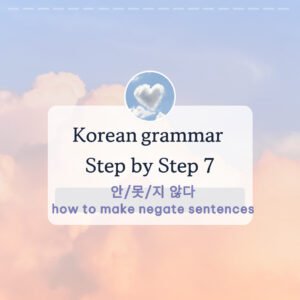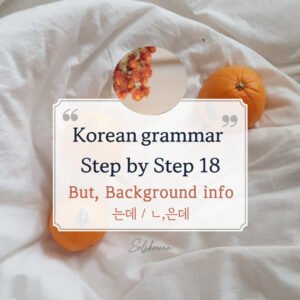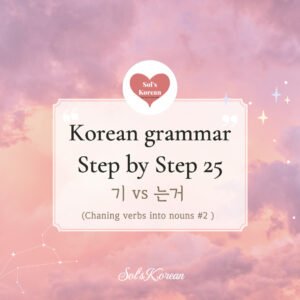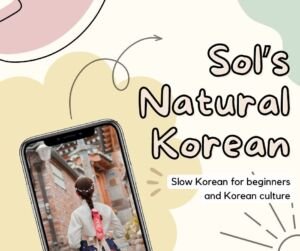To not be (이/가) 아니다(아니에요)
Hello, welcome to our Third step of your Korean journey!
Today, we’re diving into the essential Korean verb “(이/가) 아니다,” which means “to not be.”
This verb is crucial for constructing negative sentences in Korean, such as “I’m not a student” or “She is not Korean.”
Let’s break down how to use it effectively.
Part 1,
Let’s grasp the concept of grammar
In Korean, the verb “아니다” is used to express that something is not something else.
It corresponds to the English “to not be.” Unlike in English, where “not” is simply added to the verb “to be,” Korean uses a separate verb.
We can conjugate 아니다 to 아니에요. (fairly formal), 아닙니다 (extremely formal), and 아니야 (informal)
| 아니다 | To not be (original form) |
| 아닙니다 | extremely formal |
| 아니에요 | fairly formal, most common |
| 아니야 | informal |
The verb “아니다” is commonly used with the subject particles “이” or “가.”
The choice between “이” and “가” depends on the final consonant of the noun preceding it:
– Use “이” when the noun ends in a consonant.
– Use “가” when the noun ends in a vowel.
Let’s look at some examples:
Example 1:
I’m not a student.
나는 학생이 아니에요.
나 (I) + 는 (subject particle) + 학생 (student) + 이 (particle/again) + 아니에요 (am not)
* you can use 내가 as well. 내가 학생이 아니에요
Example 2:
My mom is not a doctor.
우리 엄마는 의사가 아니에요.
우리 엄마 (my mom) + 는/가 (subject particle) + 의사 (doctor) + 가 (particle) + 아니에요 (is not)
It’s normal and common for “이/가” particles to come together with the verb “아니다.”
However, you will often hear Koreans omitting these particles when speaking colloquially.
Example 3:
It’s not a chair.
의자가 아니에요.
의자 ends in a vowel, so we use 가 then 아니에요.
Example 4:
This is not my phone.
이거는 내 휴대폰이 아니에요.
내 휴대폰 ends in the batchim(ㄴ), we put 이 아니에요.
이거 (this (thing)) + 는/가 (subject particle) + 내 휴대폰 (my phone) + 이 (particle) + 아니에요 (is not)
Example 5:
They are not my friends.
그 사람들은 내 친구가 아니에요.
친구 ends in the vowel, we put 가 아니에요.
그 사람들 (they) + 은/이 (subject particle) + 내 친구(my friends) + 가 (particle) + 아니에요 (is not)
Let’s take a quick quiz!
1. 우리 엄마 __________ [It’s not my mom]
(1) 가 아니에요
(2) 이 아니에요
2. 책 ___________ [It’s not my mom]
(1) 가 아니에요
(2) 이 아니에요
3. 그 사람은 내 여동생_________ [She is not my younger sister]
(1) 가 아니에요
(2) 이 아니에요
4. 그거는 쿠키__________ [It’s not a cookie]
(1) 가 아니에요
(2) 이 아니에요
These are the answers:
1. 우리 엄마가 아니에요 (엄마 ends in the vowel)
2. 책이 아니에요 (책 ends in the batchim (ㄱ))
3. 그 사람은 내 여동생이 아니에요 (여동생 ends in the batchim(ㅇ))
4. 그거는 쿠키가 아니에요 (쿠키 ends in the vowel)
Let’s practice more!
Put together sentences on your own
1. I’m not Korean
2. You are not my friend
3. He is not my boy friend (남자 친구)
4. They are not my family
5. We are not Russian (러시아 사람)
Let’s check the answers together!
I’m not Korean
나는 한국사람이 아니에요 (fairly formal)
저는 한국사람이 아니에요 (formal)
* To be very casual, you can say 나는 한국사람이 아니야!
* To be very formal, you can say 저는 한국사람이 아닙니다.
* you can use 내가/제가 as well.
You are not my friend
너는 내 친구가 아니에요 (normal)
당신은 제 친구가 아니에요(formal)
* 당신 is a formal way to say “you”, but it’s not very commonly used.
He is not my boy friend (남자 친구)
그 사람은 내 남자친구가 아니에요.
* 걔는 내 남친이 아니야(very casual). 남친 is an abbreviation of boy friend!
* 그 분은 제 남자친구가 아닙니다(very formal)
They are not my family
그 사람들은 우리 가족이 아니에요 (fairly formal)
그 분들은 제 가족이 아닙니다 (very formal)
We are not Russian (러시아 사람)
우리는 러시아 사람이 아니에요 (fairly formal)
* you can use 가 in stead of 는
Before practicing more, I’ll share some tips.
Particles can be tricky and troublesome.
In daily conversations, you will hear native Koreans omit subject particles (은/는/이/가) about 50~70% of the time. We tend to only use them to emphasize/ contrast/ compare the subjects.
Also, we don’t always need to specify the subject if it’s clear from context.
So, to say “I’m Korean”, most of the time we just say 한국인이에요 without explicitly saying “I (나는)”.
Similarly, for “I’m not Korean”, we simply say “한국인(이) 아니에요”.
Keep in mind this and let’s practice a bit more!
1. It’s not a restaurant(식당). It’s my house(집)
2. It’s not coffee(커피). It’s water(물)
3. I’m not an office worker. I’m a software engineer(개발자)
4. My mom is not a singer(가수). She is a housewife(전업주부)
5. My dad is not an English teacher. He is a Korean teacher
6. My family is not American. We are Mexican
7. This isn’t my book. That is mine(내 거)
8. That is not our taxi. It’s theirs(그 사람들 거)
9. This is not mine(내 거). It’s yours(너 거)
10. That is not my laptop(노트북). It’s his/hers (그 사람 거)






